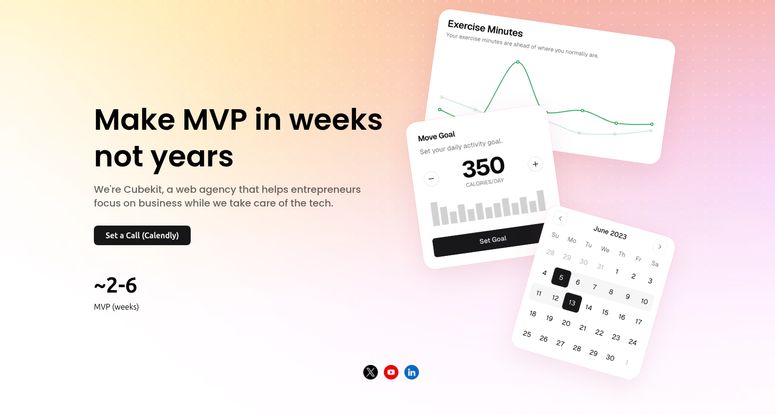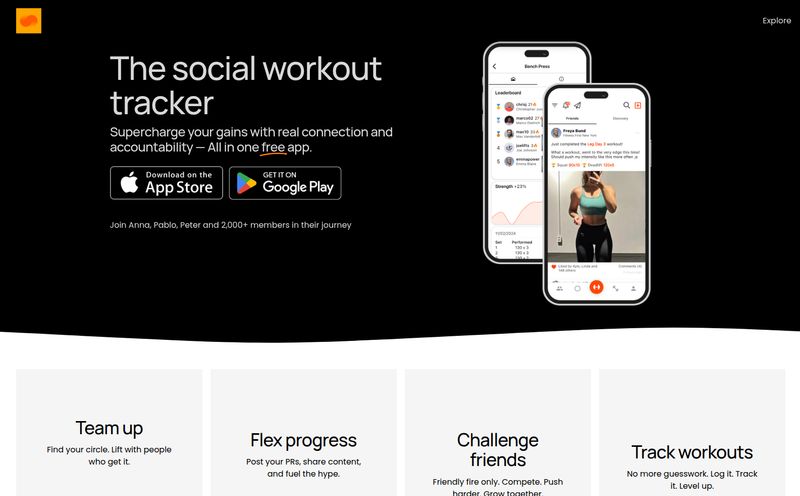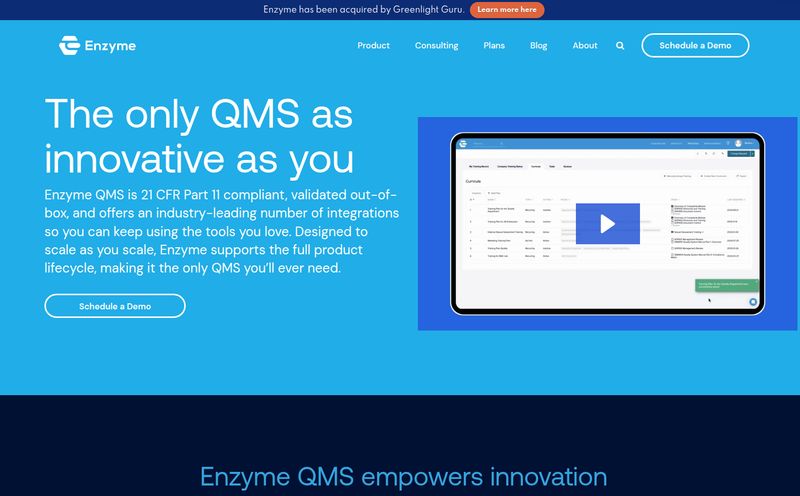Every entrepreneur, founder, and wannabe-founder has had that moment. You’re scribbling on a napkin, pacing your living room at 2 AM, convinced you’ve just stumbled upon the next big thing. The idea is brilliant. It’s perfect. It’s going to change the world, or at least a small, profitable corner of it.
And then… reality hits. The idea is one thing, but building it is another. You need a website, an app, a platform. You need tech. Suddenly, your brilliant idea is stuck behind a massive wall called 'development,' and that wall is expensive, time-consuming, and frankly, a little terrifying.
I’ve been in the SEO and traffic game for years, and I’ve seen more brilliant ideas die on the vine than I can count, all because of that wall. They get stuck in development hell, run out of money, or spend a year building something nobody actually wants. It’s a classic story, right? Well, a web agency called Cubekit is trying to rewrite that story, and I have to say, their approach is pretty interesting.
The Founder's Dilemma: Drowning in Tech Instead of Talking to Customers
The standard path for a non-technical founder is a rocky one. You either try to learn to code yourself (say goodbye to the next 18 months of your life), or you try to find a technical co-founder or a freelance developer. Good luck with that. Finding the right tech talent is like dating in a major city—the good ones are already taken, and the rest… well, it’s a gamble.
Even if you find someone, you quickly get bogged down in conversations about frameworks, databases, and server architecture. All you wanted was a simple product to test your idea, and now you’re debating the merits of React vs. Vue. This is precisely where startups go to die. You should be talking to potential customers, not your developer about teh database schema.
What Exactly Is Cubekit? More Than Just Coders for Hire
This is where Cubekit steps in. On the surface, they're a web agency. But digging a bit deeper, they position themselves more like a technical launch partner for entrepreneurs. Their headline says it all: “Make MVP in weeks not years.”
An MVP, or Minimum Viable Product, is the most basic version of your idea that you can release to get real-world feedback. The goal isn’t perfection; it’s learning. Cubekit claims they can get that MVP built for you in about 2 to 6 weeks. That’s an incredibly aggressive timeline, and if they can deliver on it, it’s a game-changer for anyone bootstrapping a project.
They handle the tech, so you, the founder, can do the one thing that actually matters in the early days: focus on the business. Go find customers. Refine your marketing. Build a community. You know, the stuff that actually makes money.

Visit Cubekit
The AI Secret Sauce for Nailing Your Launch Message
Okay, fast development is great. Lots of agencies promise speed. But this is the part that really caught my eye. Cubekit integrates with X (formerly Twitter) and Reddit to analyze content before you post it.
Think about that for a minute. It uses AI to look at your past posts and the general conversation in your niche to predict how your new content will be received. It tries to forecast audience reactions, engagement levels, and even potential risks. This is like having a tiny, data-driven communications expert sitting on your shoulder, whispering, “Are you sure you want to phrase it that way?”
I've seen so many product launches fall flat because the messaging was off. The founders were too close to the project and couldn’t see how their words would land with a real audience. This tool aims to de-risk that critical launch phase. It’s not just about avoiding a PR disaster; it’s about fine-tuning your posts for maximum positive impact. In a world where your launch-day tweet can make or break you, that's a powerful tool.
Breaking Down the Cubekit Process
From an Idea to a Real Product in Under Two Months
The value of a 2-6 week MVP cycle can't be overstated. It’s the core principle of methodologies like The Lean Startup by Eric Ries—the whole build-measure-learn feedback loop. The faster you can get through that loop, the higher your chance of success. By outsourcing the “build” part to a dedicated team like Cubekit, you can spend your energy on the “measure” and “learn” phases. You get a working product in your hands quickly, so you can stop guessing what people want and start getting actual data.
Pre-Testing Your Social Media for the Win
The AI content analysis is the other half of the equation. Imagine you're about to launch your new fitness app. You’ve crafted a launch announcement for Reddit’s r/Fitness community. Before you hit post, you run it through Cubekit’s system. It might tell you that the tone is a bit too corporate for that subreddit, or that mentioning a specific feature is likely to trigger skepticism. You can then tweak your message, post with confidence, and have a much better conversation with your first potential users. It's not magic, it's just smart data application.
What’s the Catch? A Few Things to Consider
Now, no service is perfect, and I wouldn’t be doing my job if I didn’t bring up a few points of friction. First, the pricing isn’t publicly listed. This is pretty standard for agencies that do custom work, but it means you can't just quickly compare costs. You have to book a call (their primary call-to-action is a Calendly link) to get a quote. This is a hurdle, but it also makes sense—every MVP is different in scope.
Second, as a bit of a tech nerd myself, I noticed there’s not a ton of information on their specific technology stack. For their target audience of non-technical founders, this might actually be a plus. It's the ultimate “black box” approach—you don’t need to worry about the engine, just that the car drives. However, if you're a founder who wants to be deep in the technical weeds, you’ll definitely need to ask those questions on your intro call.
So, Is Cubekit the Right Partner For You?
In my opinion, Cubekit seems like a fantastic fit for a specific type of entrepreneur:
- The non-technical founder with a great idea and industry expertise.
- The solopreneur who needs to be a force multiplier and can’t do everything alone.
- Any startup team that values speed-to-market above all else.
Who is it probably not for? Large companies with established in-house development teams, or founders who want to personally write the code and control every minute technical decision. Cubekit’s value is in abstracting away the tech so you can focus elsewhere.
Personally, I'm optimistic about services like this. They democratize entrepreneurship. They lower the barrier to entry, so the best ideas can win, not just the ones from people who happen to know how to code.
FAQs: Your Cubekit Questions Answered
- What is an MVP and why is it so important?
- An MVP is a Minimum Viable Product. It’s the simplest, most basic version of your product that still provides value to a user. It's important because it lets you test your core business assumptions with real customers without wasting years and a fortune building a full-featured product no one wants.
- How does Cubekit’s AI content analysis actually work?
- Based on their description, it integrates with platforms like X (Twitter) and Reddit. It analyzes language, tone, and topics from past successful (and unsuccessful) posts within a community to predict how your draft content might perform. It’s a predictive model designed to guide your social media strategy.
- How long does it really take to get an MVP?
- Cubekit advertises a timeline of ~2-6 weeks. This will obviously depend on the complexity of your idea. A simple data-tracking app will be faster than a two-sided marketplace, but it's a strong indicator of their focus on speed.
- How much does Cubekit cost?
- Their pricing is not public. Like most web development agencies, they provide custom quotes based on the project's scope. You'll need to schedule a call with them to get specific pricing details for your MVP.
- What social media platforms does the AI tool work with?
- The information available highlights integration with X (Twitter) and Reddit, two platforms that are crucial for community building and initial product launches.
- Can I use Cubekit if I'm a technical founder?
- You could, especially if your goal is pure speed and you want to delegate the initial build to focus on higher-level architecture or business development. It would be a strategic choice to outsource the initial grunt work to move faster.
Don't Let a 404 Error Be the End of Your Dream
Too many startup dreams end up like a broken link—a '404 Page Not Found' error on the server of ambition. The idea was there, but the technical execution failed. Cubekit is betting that they can fix that broken link for a lot of entrepreneurs. By combining rapid development with smart, AI-powered communication tools, they’re tackling the two biggest hurdles a new founder faces.
If you're sitting on an idea, stuck behind that wall of tech, a service like this might just be the sledgehammer you need. It’s definitely worth a conversation.
Reference and Sources
- Cubekit's Official Website: (Note: A direct URL wasn't provided, but you can find them via search).
- Calendly: The scheduling tool used by Cubekit for consultations.
- The Lean Startup by Eric Ries: A must-read book on the MVP and build-measure-learn methodology.



